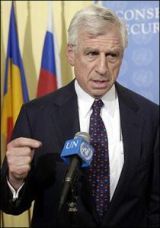US revises UN draft on Sudan in quest of votes
By Evelyn Leopold
UNITED NATIONS, Sept 14 (Reuters) – The United States modified its call for U.N. sanctions against Sudan on Tuesday but still kept up the threat of punitive measures if Khartoum did not stop atrocities in its Darfur region.
 In an effort to get support from the 15-member U.N. Security Council, U.S. Ambassador John Danforth distributed a revised text of a U.N. Security Council draft resolution that threatens to consider sanctions on Sudan’s oil industry and calls for an expanded African Union monitoring force in the Darfur region.
In an effort to get support from the 15-member U.N. Security Council, U.S. Ambassador John Danforth distributed a revised text of a U.N. Security Council draft resolution that threatens to consider sanctions on Sudan’s oil industry and calls for an expanded African Union monitoring force in the Darfur region.
“I think it’s pretty close to what it was and we’ll just see what happens,” Danforth told reporters. “We hope to have a vote, I hope by the end of the week.”
Specifically the new version, obtained by Reuters, said the council “shall consider” punitive measures, such as actions “to affect Sudan’s petroleum sector” if atrocities in the Darfur region continue and Khartoum fails to cooperate with an expanded monitoring force from the African Union.
Previously, that provision declared that the council “will take further actions” if Sudan did not comply.
China last week threatened to use its veto power on the council if major changes were not made. It had no immediate reaction to the new text. Russia, Pakistan, Algeria and others also objected to the sanctions threat. European Union nations and Chile back the United States.
The U.S.-drafted resolution also asks U.N. Secretary-General Kofi Annan to establish a commission that would determine whether crimes in Darfur amounted to genocide, a provision several council members found objectionable.
Rebels began an uprising in Darfur in February 2003 after years of skirmishes between mainly African farmers and Arab nomads over land and water in the arid area as large as France.
The Islamic government turned to militia, called Janjaweed, and drawn chiefly from the nomadic Arab population, to help suppress the rebels. The Janjaweed are accused of killing, raping and uprooting African villagers.
In Khartoum, Sudanese officials objected to any talk of sanctions. “Our reaction is very clear that sanctions will not help solve the problem. We feel that we have enough problems, said Mutrif Siddiq, the under-secretary for foreign affairs.
“We need to be supported in solving and surpassing the situation rather than threatened with sanctions,” he said.
In Geneva, the World health Organization reported that up to 10,000 people, many of them children, were dying each month from disease and the effects of violence in Darfur camps.
A study of settlements in the west and the north of the conflict ridden region, carried out by the U.N. agency and the Sudanese government, pointed to a monthly toll of 6,000 to 10,000 out of a displaced population of 1.2 million.
The mortality rate was in line with the 50,000 dead which the U.N. and other international bodies have been using as the likely toll since the crisis erupted, WHO officials said.
In Washington, U.S. Secretary of State Colin Powell told Reuters in an interview that Sudan had failed to make Darfur safe and was still backing Arab militia.
“I hope they realize that they need to get out of a situation they find themselves in. They need to get out of being seen by the world as responsible for the death of tens upon tens of thousands of people,” Powell told Reuters.
The new U.S. draft resolution mentions an African Union report of government helicopter assaults accompanying Janjaweed attacks on villages on Aug. 26 and Sept. 3.
Powell last week said acts of genocide had been committed, but no other country has gone that far.
Sudan is also under pressure to accept a U.N. proposal to expand a small Africa Union monitoring force to about 3,000 observers and soldiers to guard them. The resolution encourages “quick, investigative” response to alleged violations as well as trips to makeshift camps for displaced villagers .
“The more monitors of the African Union involved, the less likely it is that the atrocities can continue,” British Ambassador Emyr Jones Parry told reporters.
In the Nigerian capital of Abuja, talks between Sudan and African rebels from Darfur were in danger of collapsing.
The African Union, which is hosting talks, made a last ditch attempt on Tuesday to break a deadlock after rebels said they would not sign a humanitarian deal with the Sudanese government until key security issues are agreed. One of them is disarmament of the Janjaweed.
African Union chairman and Nigerian President Olusegun Obasanjo summoned both sides Tuesday for an emergency meeting in an effort to rescue the negotiations.
(additional reporting by Saul Hudson in Washington, Felix Onuah in Abuja and Opheera McDoom in Khartoum)
